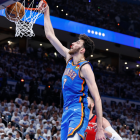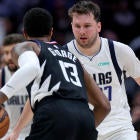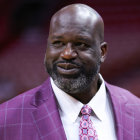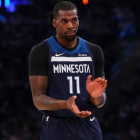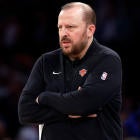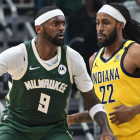While NBA teams like the Lakers, Bucks and Clippers have cause for concern due to what will end up being nearly a five-month hiatus from competitive basketball, you probably won't hear many complaints from the Portland Trail Blazers. Before the COVID-19 pandemic brought the sports world to a halt, teams at the top of the standings were riding waves of momentum they hoped would propel them to a championship -- meanwhile the Blazers were stuck trying to keep their heads above water.
After making the Western Conference finals in 2019, Portland has sputtered all season long partly due to injuries to big men Jusuf Nurkic and Zach Collins, and in early December it lost Rodney Hood, one of the team's few reliable wings, to an Achilles tear. Despite all of that, the Blazers are poised to enter Orlando in July just 3 1/2 games behind the Memphis Grizzlies for the eighth and final playoff spot in the Western Conference, and have suddenly become arguably the most dangerous of the six non-playoff teams invited to resume the season.
Many have pegged the New Orleans Pelicans, led by Zion Williamson, as the favorite to capture the No. 8 seed, either by catching the Grizzlies in the eight "seeding games" or by virtue of the potential play-in tournament, but the Blazers -- led by Damian Lillard and CJ McCollum -- may have just as good of a shot, if not better, to claim the postseason berth and possibly do some damage in the first round. Let's look at a few reasons why.
Finally healthy
Time, as they say, heals all wounds -- and the Blazers had some serious wounds to heal. Unfortunately, Hood remains out of the equation, but all indications are that Collins and Nurkic will both be available to practice and play when the season resumes. Collins, who had shoulder surgery in November, said that "everybody is on the same page" and that he expects to be medically cleared to resume practicing whenever they get the green light. Nurkic, who was having a career year in 2018-19 until a nasty leg injury forced him to miss the remainder of that season and all of this season, was just four days away from returning to the court when the league shut down in March. Both Collins and Nurkic have had extra time to get themselves 100 percent, and they will add two more large, skilled bodies for a severely thin Blazers roster.
"With Nurk and Zach and guys being healthy -- that's what we've been looking for," Blazers forward Carmelo Anthony told CBS Sports before the NBA's 22-team plan was approved. "I feel like if we have a healthy team then, yes, we want to go in. We want to go in and compete because I know we would be able to compete at a high level if we have all of those pieces back."
Not to mention that Lillard appeared to be wearing down physically after helping Portland get back into the playoff picture by averaging 48.8 points, 10.2 assists and 7.2 rebounds over a six-game stretch to close out January, during which the team went 5-1. Lillard missed six games in late February with a groin injury, and didn't look quite right in the four games after his return before the hiatus, averaging just 20.8 points on 40 percent field goals (his season averages are 28.9 points and 46 percent shooting). A four-month break may have been just what Lillard needed to remedy the extreme toll put on his body while carrying the Blazers this season.
The break could also benefit the 35-year-old Anthony, who has surpassed the 1,600-minute mark this season after playing just 294 minutes last year in his brief stint with the Houston Rockets. Essential to the wing rotation after Hood's injury, Anthony has played nearly 33 minutes per game for the Blazers, so who's to say how long he could have kept that up without the stoppage? He also grew accustomed to training on his own while waiting over a year for an NBA team to give him an opportunity, which may give him an advantage over players who are adapting to training without team personnel or personal trainers during the pandemic.
"I work out every day. I train every day, whether I go to the gym, I'm in my garage, I'm outside in the park, I'm doing something," Anthony told CBS Sports. "I'm active every day. So my mindset will always be, 'stay ready, you don't have to get ready.' Over the years, that's what got me over the hump."
A 'big' difference
With Nurkic and Collins added to a lineup that already features Hassan Whiteside, the Blazers will have the option to play two rim-protecting, quality bigs for pretty much every minute of the game. They started Collins at power forward next to Whiteside to begin the season, and it was incredibly effective at a plus-17.2 in 49 minutes before Collins' injury in the team's third game. The Blazers also had a plus-3.4 net rating in 65 minutes last season with Nurkic and Collins playing together.
| Blazers' two-big lineups | OFFRTG | DEFRTG | NETRTG | DREB% |
|---|---|---|---|---|
Whiteside + Collins (2019-20) | 118.1 | 100.9 | 17.2 | 76.8 |
Nurkic + Collins (2018-19) | 95.1 | 91.8 | 3.4 | 88.6 |
Not surprisingly, both double-big lineups produced elite defensive rebounding numbers, while Portland has struggled with just the 27th-best defensive rebounding percentage (71 percent) this season without Collins and Nurkic. Similarly, the defense from the two-big lineups is a dramatic improvement over the Blazers' 27th-ranked defensive rating this season of 113.6.
"Defensively when you have two players like Zach and Hassan in the paint -- look, rim shots are still better than 3s. If you dominate the paint, that bodes very well for you," Portland coach Terry Stotts said in November. "I think there are a lot of ways to win games in this league. Three-pointers have obviously had a huge impact, but getting to the rim and getting free throws is still statistically, analytically even better than the 3."
Whiteside has been good protecting the rim -- in the 78th percentile allowing 0.924 pointer per possession, according to Synergy Sports Technology -- but the defense has been pretty much the same with him on or off the court. His lack of foot-speed and lateral movement allows him to be exploited in pick-and-rolls, and he has a penchant for leaving his position to chase blocked shots. Having Nurkic or Collins on the court with him will help make up for some of these shortcomings.
Looking at the numbers, small sample size notwithstanding, it's easy to project a much better Blazers defense with Nurkic and Collins back in action.
Dame time
Ask the current No. 1 seed Los Angeles Lakers which player they'd most fear in a seven-game series against any of the six non-playoff teams invited to Orlando, and they'll most likely all say Damian Lillard -- at least they should. Not only has Lillard taken his game to new offensive levels this season, but you need look no further than last postseason to see how he's capable of ripping the heart out of a playoff opponent.
If the Blazers are involved in a one-game tiebreaker or eventual play-in tournament, they have a significant experience advantage over any team except the Spurs, and Lillard would be the best player on the floor in any of those scenarios. In the playoffs or in win-or-go-home situations, sometimes that's all it takes.
Should the Blazers make the playoffs, an upset of the Lakers is still extremely unlikely, but Lillard averaged 36 points in three games against them, including a 48-point explosion in a win in Los Angeles on the last day of January. The prospect of facing him on a defending Western Conference finalist is likely more daunting than playing teams led by young stars gaining their first playoff experience like the Grizzlies (Ja Morant and Jaren Jackson Jr.), Pelicans (Zion Williamson and Brandon Ingram) or Kings (De'Aaron Fox and Buddy Hield). Outside of Lillard, the addition of Collins and Nurkic will help Portland match up against the two-big lineups that the Lakers roll out with Anthony Davis and JaVale McGee or Dwight Howard.
Schedule quirk
The play-in tournament for the No. 8 seeds is a bit confusing, but essentially the No. 9 seed, as long as they are within four games of the No. 8 seed after the eight "seeding" games, will get a chance to play for a postseason berth. The No. 9 seed would then need to beat the No. 8 seed twice in a row to advance, while the No. 8 seed would only have to win once. However, there is a realistic scenario on the horizon: What if multiple teams tie for the No. 9 spot and they're all within four games of the No. 8 seed?
Rather than engage in multiple tiebreaker scenarios or a series of one-game playoffs, the NBA will reportedly award the No. 9 spot to the team with the best winning percentage, which gives the Blazers a significant advantage. Portland played 66 games this season before the hiatus -- two more than the Pelicans and Kings, and three more than the Spurs. That means that if all four teams end up the same number of games behind after the eight seeding games, the Blazers will still have a better overall winning percentage by virtue of having played more games, and they'd get the No. 9 spot.
Surely Portland is hoping it won't come to that, but the weird schedule quirk could end up working in their favor.















